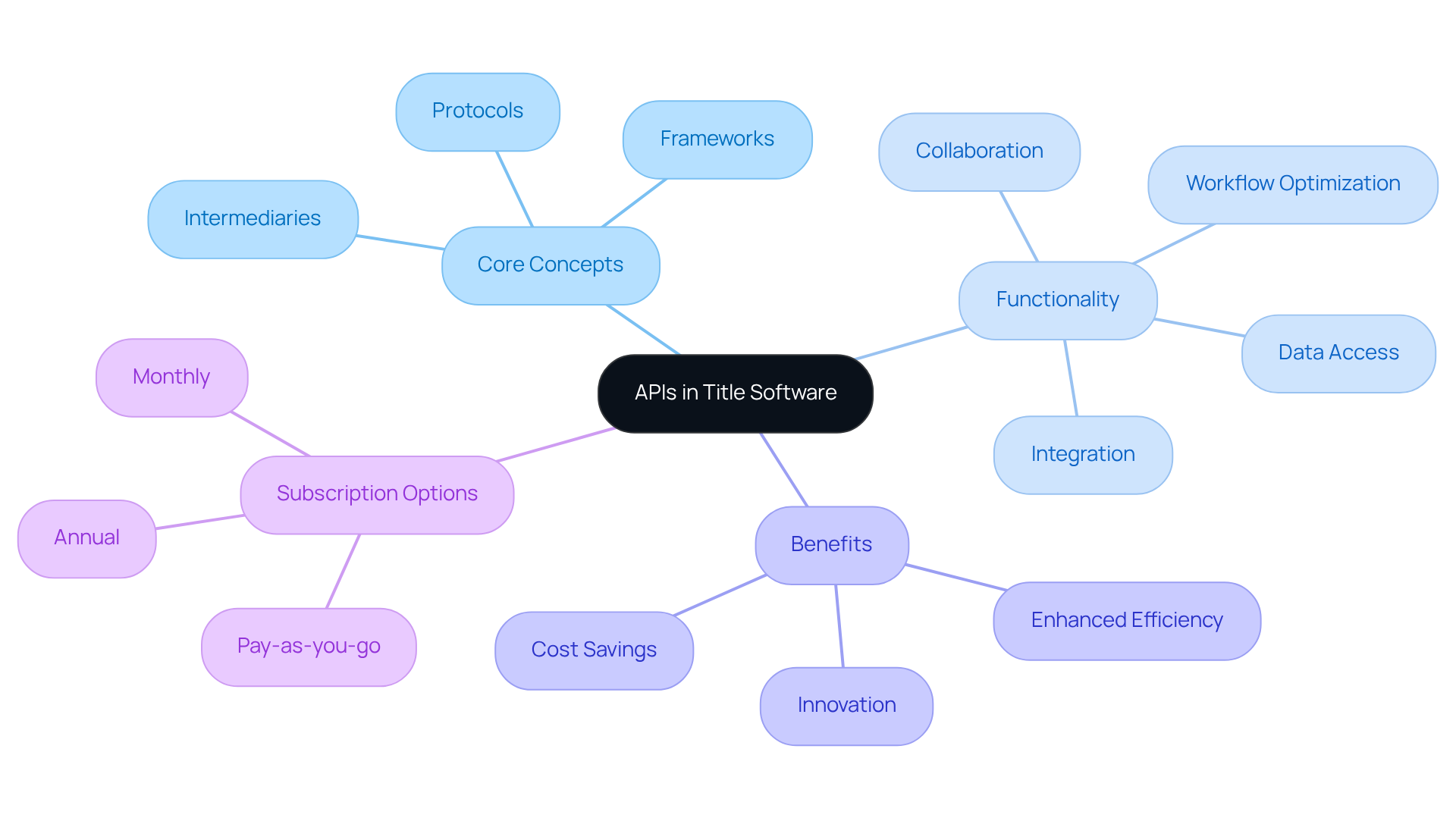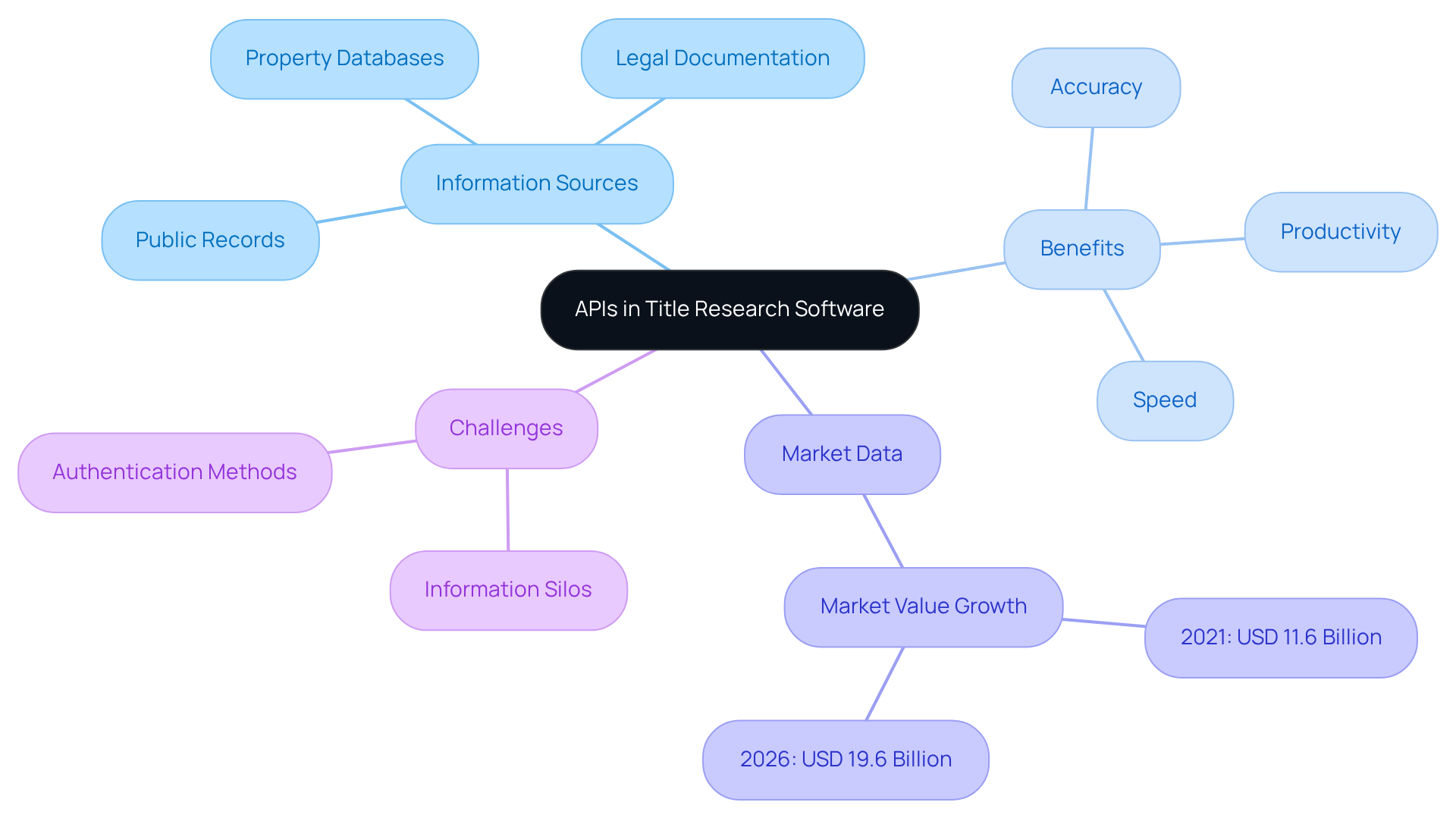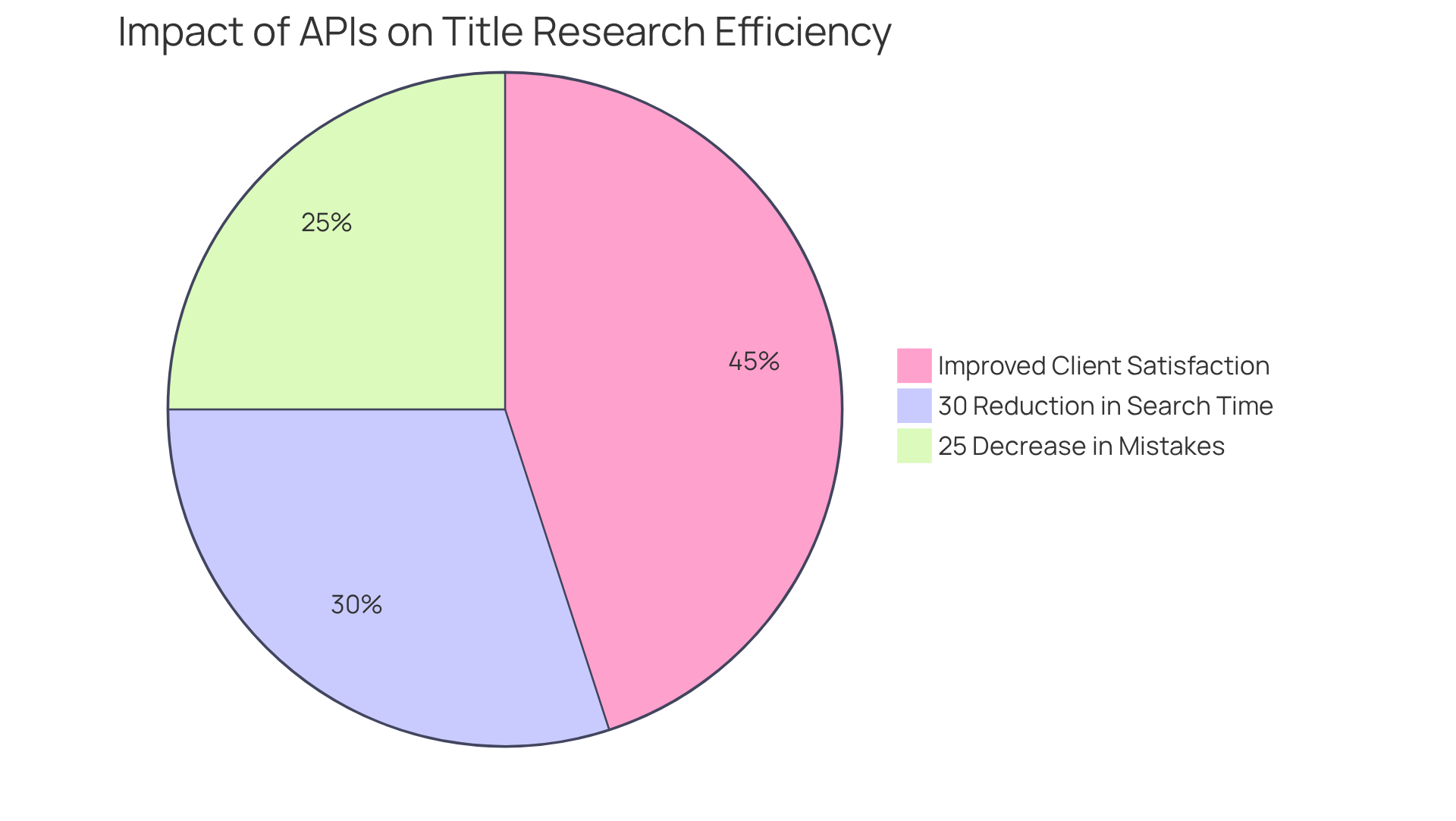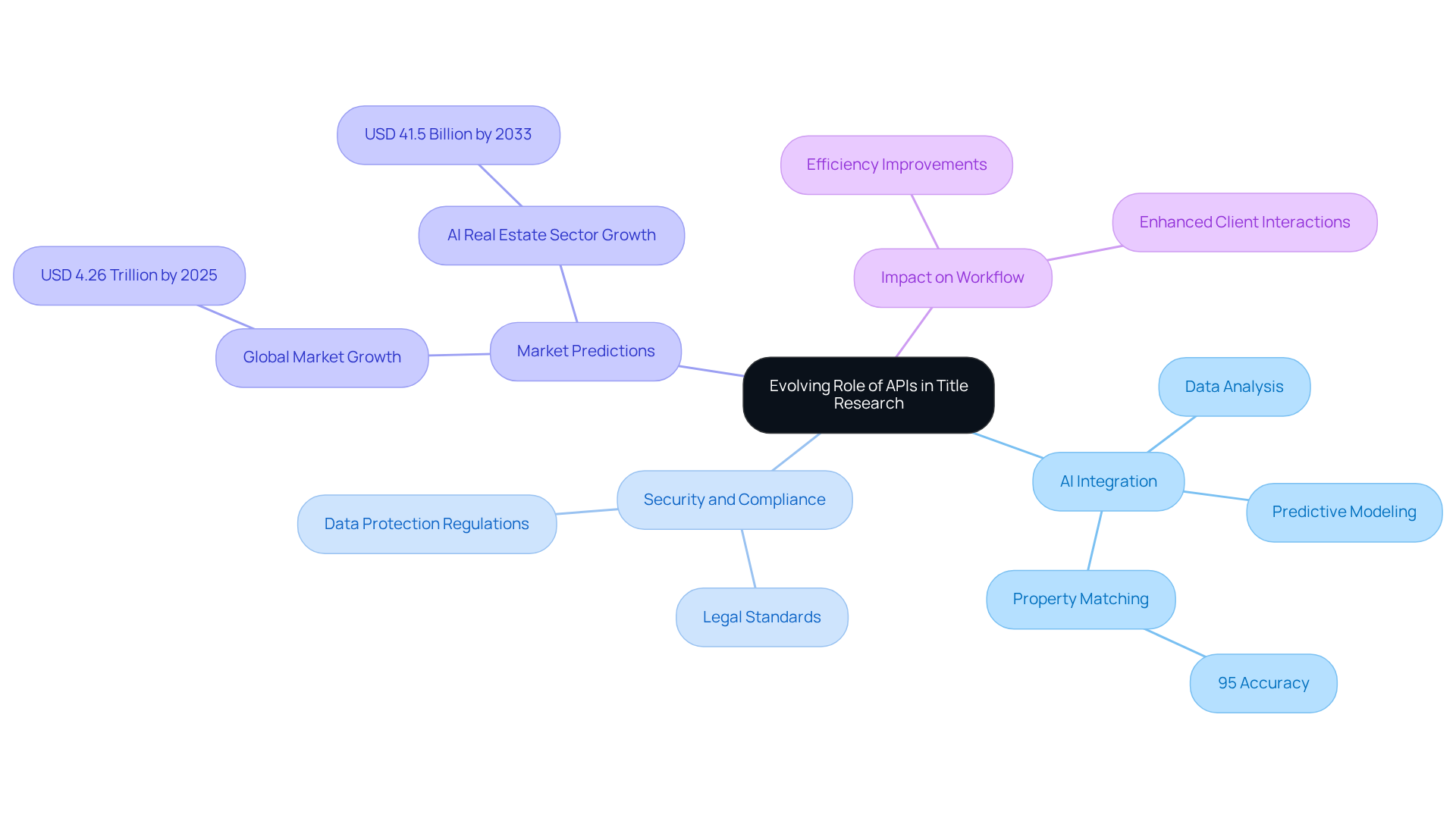Overview
The role of APIs in title software is pivotal for enhancing efficiency and accuracy. By enabling seamless integration of diverse information sources, APIs automate data retrieval and significantly reduce human error. This article illustrates how APIs facilitate real-time access to critical data, which leads to substantial reductions in search time and mistakes. Consequently, this improvement enhances operational workflows and elevates client satisfaction within the real estate sector.
Introduction
The integration of Application Programming Interfaces (APIs) has fundamentally transformed the efficiency of title software, serving as the essential link that facilitates communication and cohesive functionality among disparate systems. By leveraging the power of APIs, title companies can streamline their operations, minimize manual errors, and enhance data accessibility. This ultimately leads to heightened productivity and accuracy in title research.
However, as the demand for faster and more reliable information escalates, organizations must consider how to effectively utilize these interfaces. This approach will not only address current market needs but also prepare them for future challenges within the dynamic real estate landscape.
Define APIs: Core Concepts and Functionality
The role of APIs in title software is to serve as essential frameworks that establish the rules and protocols enabling diverse software applications to communicate effectively. The role of APIs in title software is to serve as intermediaries that facilitate the transfer of information and functionality between systems, which is vital for seamless integration. In the realm of research applications, the role of APIs in title software empowers users to access and modify data from multiple sources, significantly enhancing the software's capabilities.
For instance, APIs provide real-time access to critical information, allowing researchers to optimize workflows and improve overall efficiency in their processes. Furthermore, with subscription options available—monthly, annual, or pay-as-you-go—title companies can select a plan that aligns with their specific needs. Our customer success team stands ready to assist in customizing these solutions, ensuring that the role of APIs in title software not only accelerates the finalization of abstracts and reports but also fosters collaboration among various software tools.
This ultimately propels within the real estate sector. Expert insights underscore that the role of APIs in title software is vital for organizations aiming to enhance their operational efficiency and responsiveness to market demands.

Explore the Role of APIs in Title Research Software
The role of APIs in title software is crucial, as they seamlessly integrate various information sources, such as public records, property databases, and legal documentation. This integration empowers researchers to swiftly access extensive information, significantly and verification.
For instance, an API can connect a title research platform directly to a county's property records database, enabling users to retrieve real-time ownership information. Such capabilities not only enhance accuracy—essential for property developers—but also allow researchers to concentrate on analysis rather than collection, thereby boosting overall productivity.
The impact of application interfaces on information retrieval speed is considerable, as they facilitate real-time access to critical details, which is vital in the fast-paced real estate market. Industry experts acknowledge the role of APIs in title software, as leveraging them can yield substantial improvements in operational efficiency, making them indispensable tools for contemporary title research.
Moreover, the information integration market, valued at USD 11.6 billion in 2021, is projected to grow to USD 19.6 billion by 2026, underscoring the increasing importance of API integration in this domain. Furthermore, organizations must address challenges associated with information silos from both internal and external sources, highlighting the necessity for robust API integration strategies. Establishing strong authentication methods to safeguard API endpoints is also crucial for ensuring information protection and regulatory compliance.

Analyze the Impact of APIs on Title Research Efficiency and Accuracy
The role of APIs in title software for analyzing documents significantly enhances productivity and precision. The role of APIs in title software allows for the automation of data retrieval processes, which reduces human error associated with manual data entry. A notable example is a research company focused on property that adopted API-driven software, resulting in a 30% reduction in search time and a marked decrease in inconsistencies within ownership records. Research indicates that the role of APIs in title software can lead to a 25% decrease in mistakes during search processes, underscoring the reliability of automated systems. Furthermore, the role of APIs in title software facilitates real-time updates, ensuring researchers access the most current information, which is crucial in the dynamic real estate market. This synergy of speed and precision not only but also enhances client satisfaction by delivering timely and reliable reports.

Examine Future Trends: The Evolving Role of APIs in Title Research
As technology continues to advance, the role of APIs in title software for document examination is set to evolve significantly. Emerging trends indicate a growing integration of artificial intelligence (AI) and machine learning (ML) with application interfaces, facilitating more sophisticated information analysis and predictive modeling. Upcoming interfaces may empower document examination software to not only gather data but also analyze trends in property ownership and anticipate potential document issues before they arise. For instance, AI can accurately match buyers to properties with a remarkable 95% precision based on their preferences, showcasing the efficacy of AI in property-related tasks.
Moreover, the increasing emphasis on information security and privacy is likely to drive the development of more robust API frameworks that underscore the role of APIs in title software, ensuring compliance with legal standards while allowing for effective information sharing. As noted by the ATTOM Team, 'APIs offer immediate access to real estate information or real estate experts, investors, marketers, lenders, and service providers,' emphasizing the role of APIs in title software and underscoring their convenience and utility in the documentation process. These advancements are poised to enable researchers to operate with greater efficiency and effectiveness, adapting to the evolving landscape of .
With the global real estate market projected to reach USD 4.26 trillion by 2025 and the AI real estate sector expected to soar to USD 41.5 billion by 2033, the demand for effective and secure property research solutions is bound to increase. Furthermore, 75% of leading U.S. brokerages have embraced AI technologies, highlighting the critical nature of these innovations for future success. The integration of AI and ML into APIs will demonstrate the role of APIs in title software, empowering title researchers to refine their workflows and enhance client interactions.

Conclusion
The exploration of APIs in title software underscores their indispensable role in augmenting efficiency and accuracy within the real estate sector. Acting as crucial intermediaries, APIs facilitate seamless communication between diverse software applications and information sources, ultimately streamlining workflows and empowering users to access essential data in real-time. This integration not only accelerates the research process but also significantly enhances the reliability and precision of the information retrieved.
Key insights from the article reveal how APIs:
- Reduce manual entry time
- Bolster data accuracy
- Foster collaboration among various software tools
The automation of data retrieval processes leads to remarkable reductions in search times and errors, showcasing the transformative impact of APIs on title research. Furthermore, as the industry progresses towards greater integration of AI and machine learning, the capabilities of APIs are poised to expand, promising even greater efficiency and innovative solutions for future challenges.
In light of these advancements, the importance of adopting robust API strategies cannot be overstated. Organizations must prioritize the integration of APIs to remain competitive and responsive to the evolving demands of the market. As the global real estate landscape continues to expand, investing in effective API solutions will not only enhance operational efficiency but also position businesses for success in the dynamic future of title research.
Frequently Asked Questions
What are APIs in title software?
APIs, or Application Programming Interfaces, serve as essential frameworks that establish rules and protocols for diverse software applications to communicate effectively.
How do APIs function in title software?
APIs act as intermediaries that facilitate the transfer of information and functionality between systems, enabling seamless integration.
What benefits do APIs provide in research applications?
APIs empower users to access and modify data from multiple sources, enhancing the software's capabilities and allowing for real-time access to critical information.
How do APIs improve efficiency for researchers?
By providing real-time access to information, APIs help researchers optimize workflows and improve overall efficiency in their processes.
What subscription options are available for title companies using APIs?
Title companies can choose from monthly, annual, or pay-as-you-go subscription plans that align with their specific needs.
How does the customer success team assist title companies with APIs?
The customer success team helps customize solutions to ensure that APIs accelerate the finalization of abstracts and reports, fostering collaboration among various software tools.
What impact do APIs have on the real estate sector?
APIs propel innovation and productivity within the real estate sector by enhancing operational efficiency and responsiveness to market demands.




